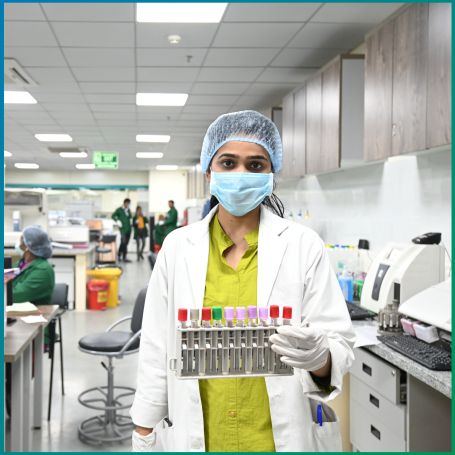
The Rheumatoid Arthritis (RA) Quantitative Test, often referred to as the RA Factor Quantitative Test, is a diagnostic blood test

The RA Quantitative Test is designed to detect and measure RF antibodies in the blood. These antibodies can sometimes attack the body’s tissues, specifically the joints, causing inflammation, pain, and swelling. While Rheumatoid Arthritis is the primary condition related to elevated RF levels, high RF can also indicate other autoimmune disorders, such as Sjögren’s syndrome or Lupus.
The RA Factor Quantitative Test is essential for those experiencing symptoms that may indicate Rheumatoid Arthritis or other autoimmune conditions. It is often ordered when patients report:
Joint Pain or Swelling: Especially in the wrists, hands, knees, or feet.
Morning Stiffness: Difficulty in moving joints, especially upon waking up.
Fatigue or Low-Grade Fever:Systemic symptoms often accompany autoimmune conditions.
The test can also be used as part of a diagnostic panel to differentiate RA from other inflammatory or joint conditions.
The normal range for RA Factor (RF) in the blood can vary depending on the testing laboratory, but generally, RF levels are considered normal if they fall below 14 IU/mL. It’s important to note that some individuals may have higher RF levels without showing any signs or symptoms of autoimmune disease. Therefore, results must be interpreted by a healthcare provider, taking the individual’s clinical history into account. Normal Range: Less than 14 IU/mL Elevated Levels: Above 14 IU/mL, suggesting possible RA or other autoimmune conditions.
1.RA Factor Positive:
If the test result shows elevated levels of RF, it is often termed RA Factor Positive. This indicates the presence of rheumatoid factor in the blood, which can be a strong marker for autoimmune diseases, particularly Rheumatoid Arthritis. However, a positive result does not confirm RA on its own and must be evaluated alongside symptoms and other diagnostic tests like the Anti-Cyclic Citrullinated Peptide (anti-CCP) test and C-reactive protein (CRP) levels .
2.RA Factor Negative: When the RF levels are within the normal range, the result is considered RA Factor Negative. However, a negative result does not completely rule out RA. Some people with RA do not produce RF, a condition known as seronegative RA.
The RA Quantitative Test is a straightforward procedure that involves drawing a blood sample from the patient’s arm. Below are the key steps in the testing procedure: Preparation: Generally, no special preparation, such as fasting, is required for this test. However, patients should inform their healthcare provider about any medications they are taking, as certain drugs can affect the results. Blood Collection: A healthcare provider will collect a blood sample from a vein, usually from the arm. The process takes only a few minutes. Laboratory Analysis: The blood sample is sent to a laboratory where it undergoes analysis to determine the level of RF antibodies. Results are typically available within 1-2 days. Result Interpretation: The results will be interpreted by a healthcare provider to assess whether RF levels are within the normal range or elevated, and to determine if further testing is necessary based on the patient’s symptoms and medical history.
A RA Factor Positive result suggests a higher likelihood of Rheumatoid Arthritis or other autoimmune conditions. Here are some implications of a positive result:
Possible Rheumatoid Arthritis: High levels of RF are strongly associated with RA, although they can be present in other autoimmune disorders as well. Higher Disease Severity: In some cases, elevated RF levels correlate with more severe disease progression, particularly in RA. High RF levels can also signal a higher likelihood of systemic complications, affecting organs like the lungs or skin. The RA Quantitative Test is primarily recommended for individuals who display symptoms consistent with Rheumatoid Arthritis or other autoimmune conditions. Those who may benefit from this test include: Individuals with Chronic Joint Pain: Especially those with pain in the wrists, hands, or other small joints that do not improve. People with a Family History of RA: Since RA has a genetic component, those with a family history of the disease are at a higher risk. Patients with Unexplained Fatigue or Fever: Chronic, low-grade fever and fatigue may sometimes indicate an autoimmune disorder. Individuals with Other Autoimmune Conditions: Conditions such as Sjögren’s syndrome or Lupus can also cause elevated RF levels.
However, not all individuals with high RF have autoimmune disease, as RF can be elevated due to infections or without any underlying pathology, particularly in older adults.Who Should Consider the RA Quantitative Test?
Choosing Diagnopein for your RA Quantitative Test in Pune comes with multiple benefits:
1.Advanced Laboratory Equipment: Our laboratories are equipped with advanced diagnostic tools, ensuring high accuracy and reliability in test results.
2.Experienced Medical Staff: Diagnopein has a team of skilled healthcare professionals who guide patients through the testing process, ensuring comfort and clarity.
3.Quick Timely Reports: We prioritize delivering prompt results, so you can receive timely diagnosis and treatment.
4.Comprehensive Reporting: Diagnopein provides detailed test results, along with interpretive support to help you understand your results fully.
5.Affordable and Transparent Pricing: Our pricing structure is clear and competitive, ensuring that quality healthcare is accessible and affordable.
6.Confidentiality and Patient Care: We prioritize patient confidentiality and deliver high-quality care, making sure all personal information remains secure.
1. RA FACTOR (Qualitative)
A positive RA factor result indicates the presence of rheumatoid factor antibodies, which are often associated with autoimmune conditions, particularly Rheumatoid Arthritis.
Generally, fasting is not required for this test, though it’s best to consult with your healthcare provider, especially if you’re taking any medications
Yes, it is possible to have seronegative RA, where RA is present despite normal RA factor levels. Other tests like anti-CCP and clinical evaluations are essential in such cases.
At Diagnopein, results are typically available within 1-2 days. We aim to deliver quick and accurate reporting.
No, high RA factor levels can be seen in other autoimmune diseases like Sjögren’s syndrome, Lupus, and chronic infections. A healthcare provider will consider these conditions based on symptoms and additional testing.